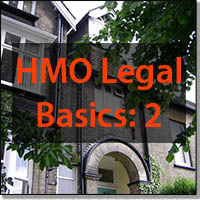 The HMO Legal Basics series is a collaboration between Tessa Shepperson and David Smith of Anthony Gold Solicitors.
The HMO Legal Basics series is a collaboration between Tessa Shepperson and David Smith of Anthony Gold Solicitors.
What is a House in Multiple Occupation (HMO)?
The second definition of an HMO is one which most people don’t know about. It is where a building has been converted to flats and the following apply:
- The building does not comply with the Building Regulations 1991 (in practice this means most conversions done before June 1992) and has not been brought into compliance with those regulations by way of later work (unlikely unless there has been significant refurbishment), and
- One third or more of the flats are rented on a shorter lease of less than 21 years.
Therefore a flat held on a long-lease will not be counted if it is occupied by the long-leaseholder but it will be counted if the leaseholder had sub-let it for 12 months.
Note that it is the length of the original lease which counts. So if you let a property on a fifty year lease but there were only 5 years less to run then it would still not be counted.
If the conversion does not comply with the relevant building regs, but there are nine flats and only two of them are rented out on shorter leases, then that is fine, the building is not classed as an HMO. If however, three are rented out on shorter leases then it will be.
These HMOs are sometimes referred to as s257 HMOs to distinguish them from the more usual HMO definition. In this series we will refer to them as Type 2 HMOs.
Most local authorities do not licence Type 2 HMOs but some, mainly in London, do licence these properties so you should check.
It is perfectly possible for an entire building to be a Type 2 HMO and some (or all) of the flats within the building to be Type 1 HMOs. This may mean that a building will have more than one licence covering parts of it.
If your property is a Type 2 HMO then you must comply with the Management Regulations and, if appropriate, obtain a license from your Local Authority in the same way as you do for a Type 1 HMO.
Further HMO resources:
![]() Advice: If you need some legal advice, for example if you have have been served with an HMO Declaration which you do not agree with, you can use our ‘HMO Hotline‘ telephone advice service.
Advice: If you need some legal advice, for example if you have have been served with an HMO Declaration which you do not agree with, you can use our ‘HMO Hotline‘ telephone advice service.
![]() Training: Easy Law Training has regular workshops on HMO Law & Practice. You can read about these >> here (you will need to scroll down to find out the dates).
Training: Easy Law Training has regular workshops on HMO Law & Practice. You can read about these >> here (you will need to scroll down to find out the dates).